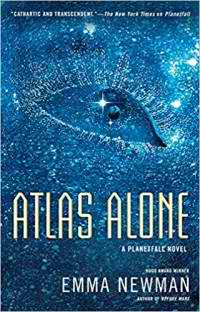Atlas Alone by Emma Newman
 Wednesday, April 17, 2019 at 8:44AM
Wednesday, April 17, 2019 at 8:44AM 
Published by Ace on April 16, 2019
Atlas Alone is the fourth book in a series. Each is written as a stand-alone, self-contained novel, although they all occupy the same universe. The books occasionally refer to events that occurred in earlier novels, particularly a project by the Pathfinders to colonize another planet.
At the beginning of Atlas Alone, everyone on Earth is dead. Dee assumes that one of the more than ten thousand people traveling through space on Atlas 2 gave the order for nukes to be fired from America to Europe. She wants to find and possibly kill the person who did it, but she doesn’t even know who is in charge of Atlas 2. She lives in her apartment and wastes her time and hates her life as the ship powers toward its destination, still 20 years away. The destination is the Pathfinder’s colony.
Dee manages to score a job that gives her access to data about media consumption on Atlas 2. She also gets access to an immersive role-playing game that is reserved for elite players. Walking through the game triggers memories of her desperate childhood, allowing the reader to understand the events that shaped Dee’s life. But playing the game may have something to do with an apparent murder on the ship. Has game fantasy crossed the boundary with reality? Is Dee an inadvertent killer?
Her job allows Dee to discover that the elite passengers and crew members all belong to the Christian States of America. Emma Newman imagines an America that became passionately religious — meaning Christian — during the 2020s. I can understand why a European might envision that, given America’s current revival of intolerance, but the loudness of the intolerant is a panic reaction to trends that are moving in the opposite direction as America becomes more open to non-Christians. Science fiction writers are entitled to imagine the unlikely, however, and the value of science fiction is its reminder that what seems unlikely today may be reality tomorrow. The book sends a cautionary and timely message about religious extremism and its tendency to eradicate nonbelievers. At the same time, the novel suggests that extremism works both ways.
The plot challenges the reader to guess the identity of the person who keeps confronting Dee in the immersive atmosphere. Dee, on the other hand, is challenged to understand the secrets behind the population chosen to take the journey, including what seems to be a deliberate attempt to maintain stratification between the haves and have-nots. That doesn’t bode well for the society that the ship leaders intend to create on the new world, although it sounds exactly like the plan wealthy people would make when developing a colony.
Character development, particularly of Dee, is perfectly integrated with the plot. The story explores interesting philosophical questions, including whether and when it is justifiable to kill some people for the greater good of others. As that theme begins to drive the plot, the novel swerves in an unexpected direction to arrive at a surprising ending that is a study in irony — albeit an ending that is consistent with the philosophical underpinnings of the plot.
Newman has tackled challenging moral questions in each book in the series while telling interesting stories. She does that again in Atlas Alone, making this series one that every thinking fan of science fiction (as opposed to the Sad Puppies who just want to read about powerful white males triumphing over aliens) will want to consider reading.
RECOMMENDED
